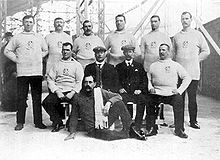Frederick Humphreys (tug of war)
| Frederick Humphreys (Tauzieher) medal table |
||
|---|---|---|
 |
||
|
|
||
| Olympic games | ||
| gold | 1908 London | Tug of war |
| silver | 1912 Stockholm | Tug of war |
| gold | 1920 Antwerp | Tug of war |
Frederick Harkness Humphreys (born January 28, 1878 in Marylebone , † August 10, 1954 in Brentford ) was a British tug of war . Together with Edwin Mills and James Shepherd , he is the most successful tug-of-war at the Olympic Games .
Career
At the 1908 Olympics in his hometown of London , Humphreys won the gold medal in the tug of war as part of the eight-man team of the City of London Police , after beating the teams of the Liverpool Police and the Metropolitan Police . All team members worked as police officers. The 100 kilogram heavy Humphreys also took part in the heavyweight wrestling competitions. In the freestyle he lost his first fight against the Norwegian Jacob Gundersen , in the Greco-Roman style Humphreys lost in the first round match against the Russian Alexander Petrow . In both competitions, he finished fifth.
Four years later, at the 1912 Games in Stockholm , Sweden , only two teams took part in the tug of war competition. The Swedes of the Stockholm Police won against the City of London Police team , which included three Olympic champions from 1908. Humphreys and the British were left with winning the silver medal. In 1920 an Olympic champion in the tug of war was determined for the last time at the Olympic Games in Antwerp, Belgium . Frederick Humphreys took part in the competitions for the third time as part of the City of London Police along with Edwin Mills and James Shepherd . After beating the Belgian team, the police were also able to win the final against the Netherlands and thus won the gold medal again.
In May 2013, two of the tug-of-war's great nieces showed family photographs and Humphrey's medals from 1912 and 1920 on the BBC program Antiques Roadshow (season 35, episode 22). At the time, nothing was known about the whereabouts of his gold medal from 1908.
Web links
- Frederick Humphreys in the Sports-Reference database (English; archived from the original )
| personal data | |
|---|---|
| SURNAME | Humphreys, Frederick |
| ALTERNATIVE NAMES | Humphreys, Frederick Harkness (full name) |
| BRIEF DESCRIPTION | British tug of war |
| DATE OF BIRTH | January 28, 1878 |
| PLACE OF BIRTH | Marylebone |
| DATE OF DEATH | August 10, 1954 |
| Place of death | Brentford |